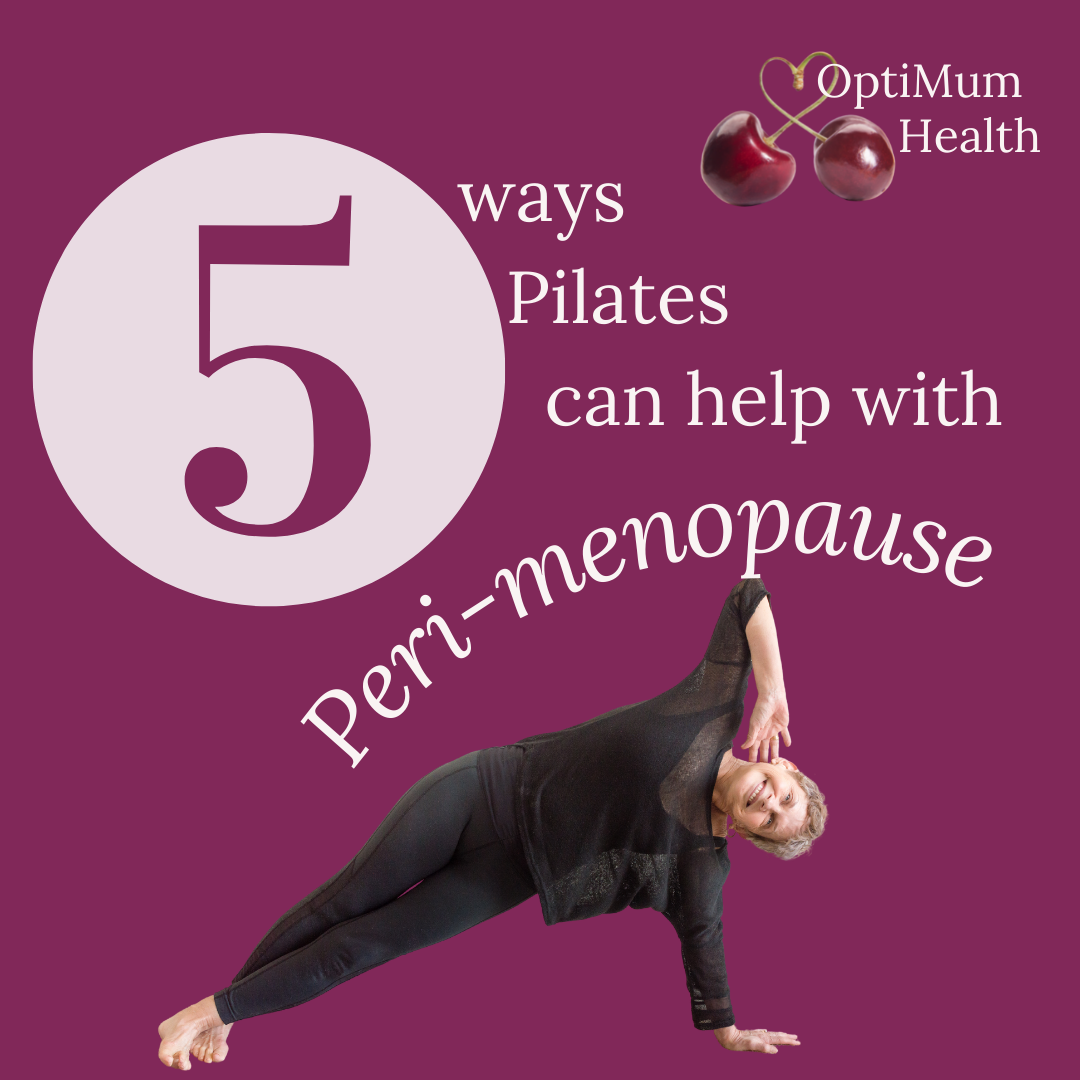How to enjoy the festive season and feel merry, even when peri-menopausal
Ah the festive season – while it can be filled with joy, twinkling lights and fun, for many women it can heighten effects of perimenopause leading to feelings of overwhelm, stress and exhaustion – not a recipe for a Merry Peri-Menopausal Christmas!
So how do we make sure we have more of the joy and fun, and less of the exhaustion and overwhelm?
Below I’ll share with you some common effects of perimenopause* that may be aggravated during this time of the year, along with some possible options to help.
- Anxiety and Depression
- Fatigue and exhaustion
- Hot flashes and heart palpitations
- Worrying about weight gain
- Brain fog and memory issues
- Mood swings and rage
This obviously isn’t an exhaustive list and it’s important for you to seek (medical) support for anything you are experiencing.
Keeping a note of what’s going on for you can be really helpful here in structuring those conversations with others – so you don’t lose your thread or forget to share any aspects of what you’re feeling.
-
Anxiety and Depression
Women are often surprised to find that anxiety and depression can be brought on or worsened by perimenopause. It’s so easy to put these down to ‘other factors’ and also to be fobbed off with antidepressants, rather than being heard and for perimenopause to be fully considered**
Anxiety can feel quite different amongst sufferers and, consequently lead to different changes in behaviours. I know for me personally, it feels like a physical bar across my chest giving a feeling of being pushed down or held back.
Starting to recognise what (and who) make you feel more anxious can be a really good starting point; as this then allows you to take action to support yourself.
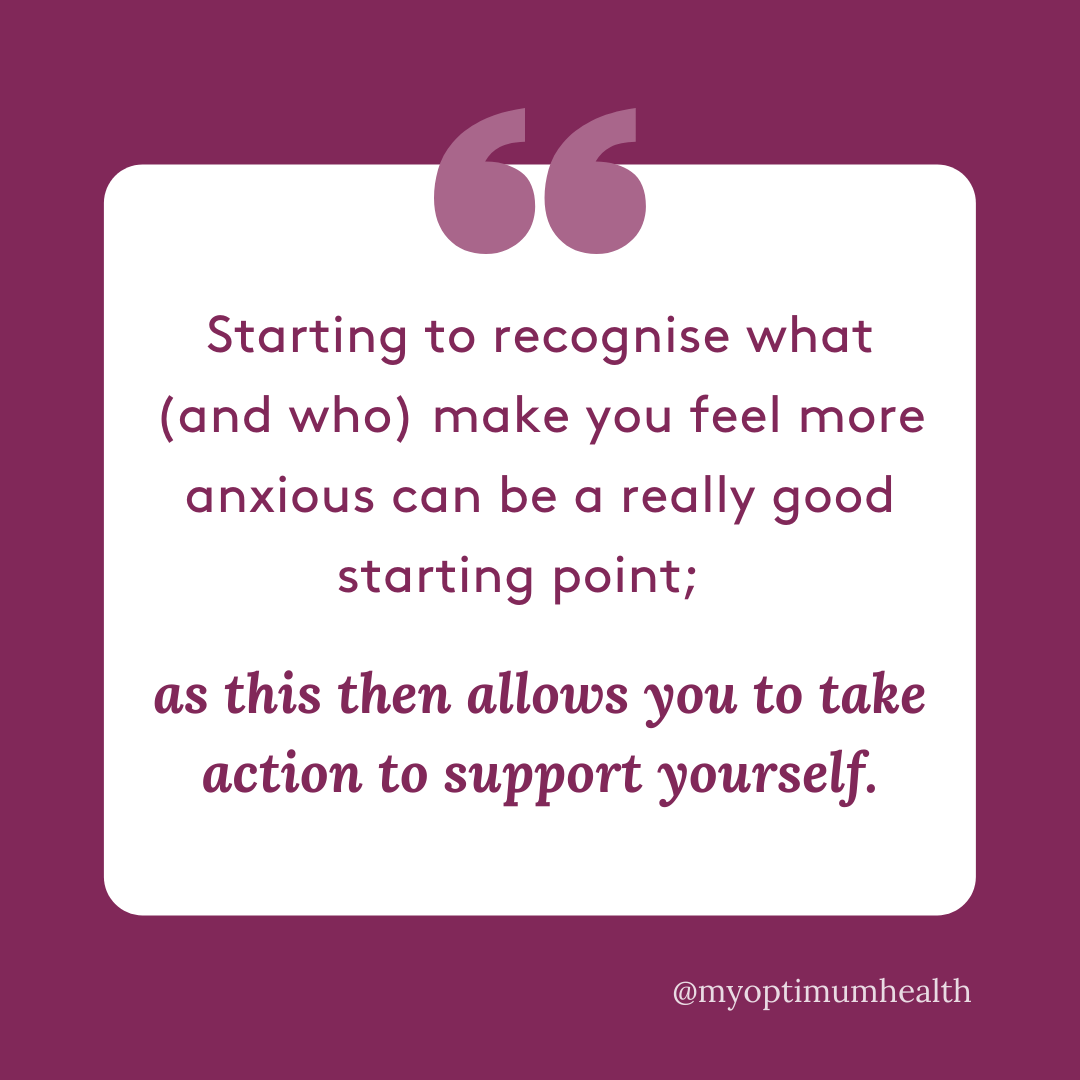
If you’re feeling anxious about affording or purchasing Christmas gifts for example, would writing a list of gift options and scheduling some time to shop in your calendar make you feel better?
I know for me shopping at any time of year makes me feel anxious – so online shopping is my saviour.
Having strategies for when anxiety hits can also reduce that feeling of overwhelm and powerlessness.
Consider having a ‘code word’ to share with your closest family and friends that lets them know when you’re feeling anxious. Let them know in advance what, if anything, you’d like them to do or say when you give the code word (it could be as simple as giving you space, reminding you to take deep breaths or guiding you out of a busy place).
Depression doesn’t always accompany anxiety. I’m not an expert in this area by any means, nor am I medically qualified in this field. It’s really important that you are able to seek support from someone who is.

To do this though we have to recognise that we might be feeling depressed because it’s not necessarily feeling really sad all the time. To others you may appear “normal” and positive even. Inside though you may feel exhausted from putting on that positive mask, or just feel a lack of joy or purpose in every day.
In addition to talking therapies, menopausal hormone therapy (also known as HRT) and breathing techniques including meditation, an approach that has been proven to help with depression is….drum roll 🥁… exercise.
If you’re wondering
- What type of exercise?
- How often do you have to exercise?
- How long do you need to exercise for?
Slow down.
Consider what you might enjoy doing first of all.
How easy would it be to start straight away with your chosen activity – and it doesn’t necessarily have to be ‘traditional’ exercise! You might take up ‘jump rope’ (skipping if you’re old school like me), ballroom dancing, Zumba or open water swimming (though possibly not in December! 🥶). How can you get moving more in every day?
-
Fatigue and exhaustion
But how can we think of factoring in more movement and exercise if we’re feeling exhausted or constantly fatigued???
I hear you on this one – for me perimenopause brought unbelievable fatigue. I literally had to cajole myself through dog walks resisting the urge to just lay down in the field there and then!
But what can help?
Let’s start with the simple, and obvious stuff:
- Getting to bed at a sensible time
- Minimising stress throughout the day and maximising calmness in the hour or two before bed
- Avoiding screens or other forms of blue light in the hour before bed
- Reducing caffeine, particularly in the afternoons***
- Ensuring your sleeping space is dark, with no distracting lights or noises (as far as possible….I have no magic solutions for children disturbing sleep but if you do, please share!!)
- Try meditating before going to bed to help quiet your mind using an app such as Headspace or Calm
- Keep a note book and pen by your bedside, so that if you’re like me and instantly start thinking of things that need doing when you lay down, you can write them down and then rest
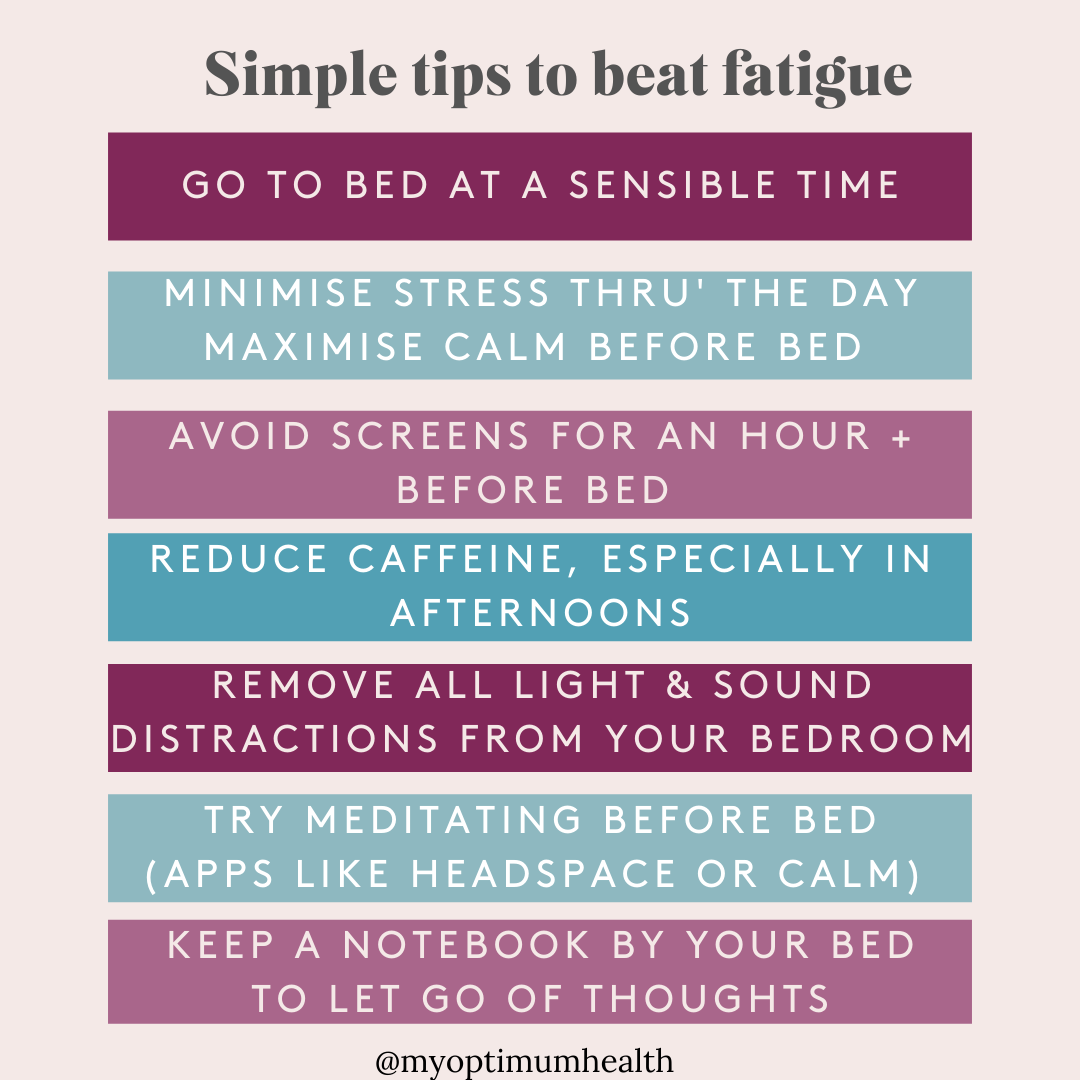
Do you have a bedtime routine?
If not, what could your new routine look like. It doesn’t have to be perfect. Just choose something and try it out, then tweak to improve from there.
If your sleep is disturbed by night sweats, check out the section on hot flashes below. Do keep a record of roughly what time your sleep is disturbed and on what nights and see if this matches to particular times in your menstrual cycle.
Sometimes our body temperature can rise in the early hours of the morning simply because we are hungry and our body is telling us we need fuel. Including suffiecient protein in every meal can help.
You may also spot particular things that trigger your night sweats (such as that nightly tipple 🥂) – if you do spot triggers, then you have the choice on whether to reduce the things that seem to be triggering your night sweats.
What about during the day?
But what if you’re constantly exhausted throughout your day?
Again let’s tackle the simple and obvious things first:
- Ensure you’re sufficiently hydrated (primarily with non-caffeinated drinks)
- Make sure you’re giving yourself enough energy through food for the activities you’re doing (and not grabbing ‘quick fixes’, or avoiding food in trying to lose weight then binging later on)
- Breathe deeply – seriously if we’re stressed our breathing pattern becomes more shallow which, over time, can affect our energy levels
- Minimise stress as far as possible – it really takes its toll on our mental and emotional energy
- Take vitamin D supplements – in the winter months I recommend between 2,000 and 4,000IU per day. This also supports immune health, skin health, mood and more
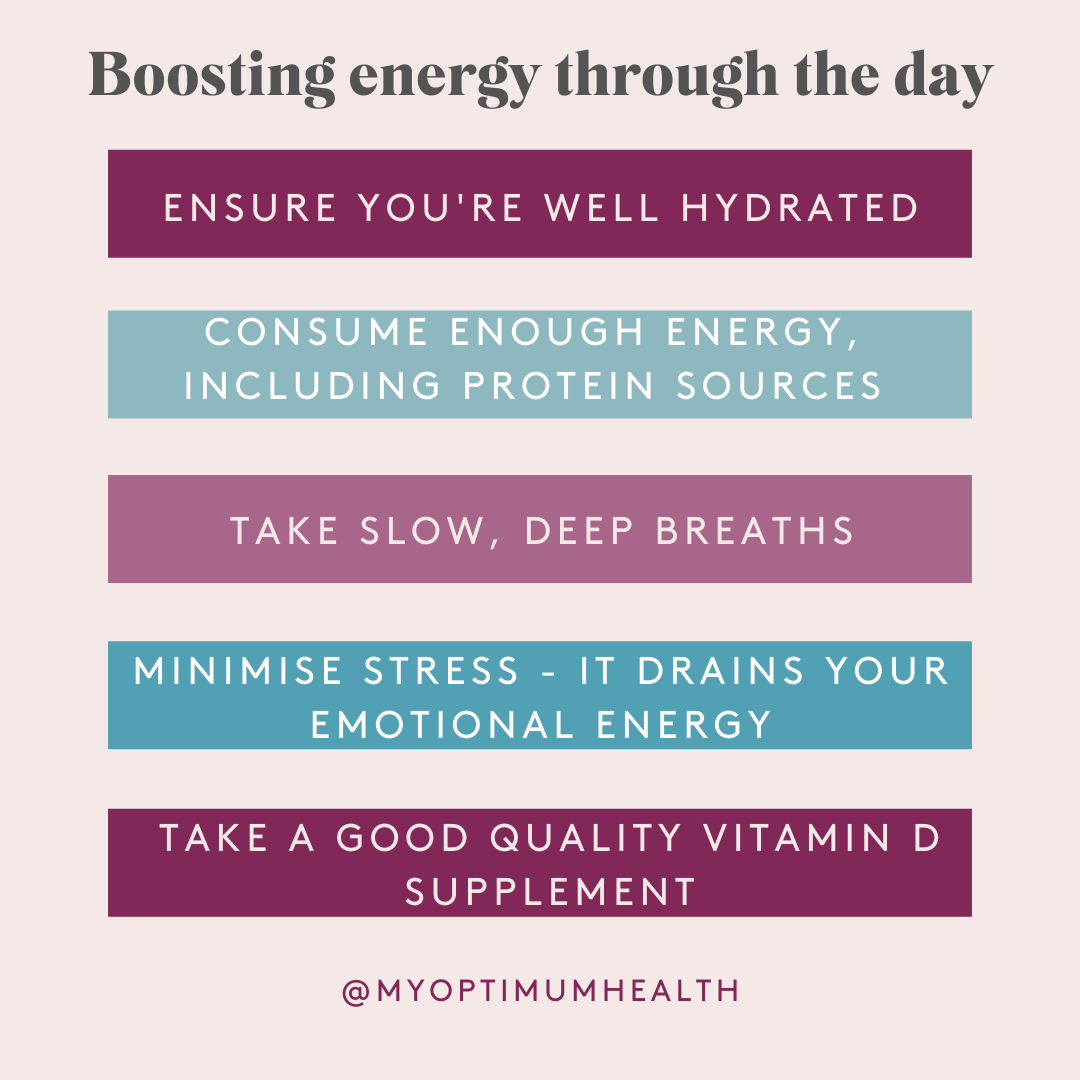
If you’re doing all of these things and still feeling exhausted and/or fatigued do talk to your doctor. Checking
- Iron levels (particularly if your periods have become heavier and/or longer)
- Thyroid function
are good recommendations
In terms of HRT, also consider Testosterone. This isn’t just a ‘male hormone’ – women actually produce more testosterone than estrogen. If your testosterone levels are lower (or the ratio of testosterone to sex hormone binding globulin (SHBG) is askew) then a testosterone cream may make a massive difference to your energy levels (and don’t worry you won’t grown a mustache!).
-
Hot flashes and heart palpitations
Hot flashes may be the first thing people tend to think of when talking about peri or post-menopause. I suppose in many ways, they are one of the most visible effects of perimenopause.
Hot flashes come under the heading of vasomotor symptoms which does also include night sweats (mentioned above) and heart palpitations.
It can be a bitter-sweet realisation that many women worsen their own hot flashes – but this in itself is a powerful realisation.
But how or why would we make our own hot flashes worse?
It’s not done consciously or on purpose obviously but there are 2 main ways I see clients aggravating their own hot flashes – this could be in terms of how:
- often they happen
- long they last
- intense they are
The 2 main ways I see female clients worsening their own hot flashes are:
- triggers – by asking clients to track their hot flashes (when they happen, how long they last, how intense they are, what they are doing at the time, what they’ve eaten/drank) over time we start to spot any common factors.From here, each woman has a choice as to whether she reduces that trigger item or not. This gives her the power of a conscious choice over what she’s doing and experiencing
- panic – you feel the stirrings of a hot flash starting and start to worry about how it’s going to look, where you are and who will see, how it’s going to feel and how long will it last….
In those moments of panic the fire is stoked 🔥🥵🔥
If we’re tracking what’s going on and can treat each flare with curiosity, noticing how it feels and how long it lasts whilst taking slow deep breaths we simply hold onto some control.
Although very simplified, these are the tenets of cognitive behavioural therapy that has been found to be really beneficial in reducing the intensity, duration and frequency of hot flashes.
We can also ‘name the shame’ – because there is absolutely no need to feel shame when it comes to how our body is responding to changing hormones.
By telling those around us what is happening and how it’s making us feel, that need to hide with panic disappears AND you may actually just help someone else learn to handle their experiences better too.
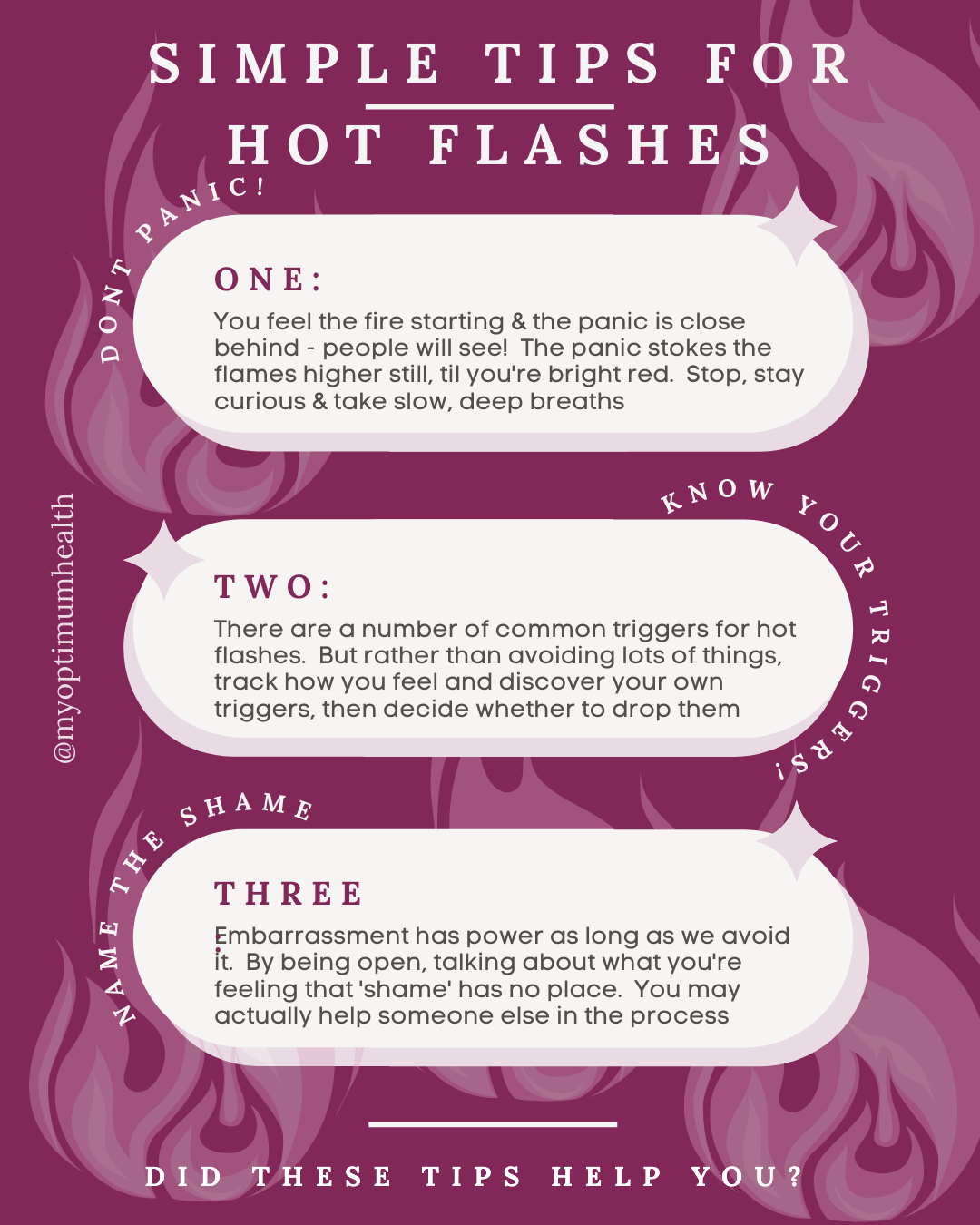
But what about heart palpitations?
First up, if you’re experiencing heart palpitations it’s important to get these properly checked out with a medical professional to make sure nothing else untoward is going on.
Secondly, a similar approach to what I described above for hot flashes will help:
- note down when they’re happening to see if you can spot any triggers
- take slow, deep breaths
- minimise stress
-
Worrying about weight gain
It’s Christmas, with all the trimmings and treats that go with it. So if it’s starting to feel like your waistline expands just watching adverts for food, it can be a really stressful time of year if you’re worrying about your weight.
Two most unhelpful approaches I see women taking at this time of the year are:
- I just won’t have any of it and will stick with carrot sticks and celery
- The “fu#k it” approach where you go all out and “will worry about it in the New Year”

Complete denial can lead to unhappiness, stress about eating out on social occasions and potentially a binge out when you feel you’ve restricted yourself too far for too long.
Similarly, just blitzing every Christmas treat going and gorging on festive feasts can leave you feeling over-full, bloated, lethargic…and guilty.
There is a happy medium!
Personally, I like to buy the miniature versions of festive foods such as mince pies so I can savour and enjoy the taste without over-consuming.
Many of my clients find the “if…then” approach works for them too. For example, if they have a really big feast one day, they’ll cut back on the next day or two and look to include more movement.
I guess one ‘treat’ that people often overlook when it comes to festive fun but avoiding weight gain is alcohol. Unfortunately, not only does alcohol have calories (some drinks more than others), for many women alcohol can emphasize and escalate perimenopausal symptoms.
At the end of the day, remember these are all choices that you have available.
Oh, and do get enough sleep.
Whilst it’s tempting to stay up later because you’re on holiday or have so much to do, or have parties 3 nights in a row, being tired makes us:
- More hungry
- Feel less full after eating
So taking care to get sufficient rest can really help to manage your weight.
-
Brain fog and memory issues
“What did I come in here for?” 🤔
“Where did I put my glasses/keys/pen/brain?” 🤨
“What’s his/her name again?”
Phew the effect of peri- and post-menopause on our brain can be really marked.
And at Christmas time the obvious pressure is remembering who to buy gifts for, remembering what they do and don’t like
….and then remembering where the safe place is that you’ve hidden them all in when it comes to wrap or deliver them!!
Supporting our “executive functions” can be a real life-saver through perimenopause and beyond. Here are some simple tips that might help, especially at this time of year:
- Stay hydrated (I’ve already said it above but being even a tinsy bit dehydrated affects our ability to make decisions and remember things)
- Make lists – either on a notebook or in your phone. Apps such as “Todoist” can help you to note down things you need/want to do, so you don’t have to try and remember them all
- Build habits such as always putting your keys in the same place when you come in the door
- Minimise stress (yep that one again: higher stress levels deplete our emotional energy which also affects our memory and decision making ability)
- Improve your sleep – it seems basic I know, but later nights in the run up to Christmas can take their toll, blurring our thinking and fogging up our brains
-
Mood swings and rage
Peace on earth and goodwill to all folk may be a distant thought if your moods are flipping out and menopausal rage is sparking 🤬🤯
- Someone eats the mince pies you bought/baked for another occasion 😡
- You forgot to book a slot for the Christmas shop delivery 😖
- Traffic is building up and you’re having to fight your way through other shoppers 😫
- The kids are too excited to sleep and bedtime battles are wearing thin 😣
- You’ve been trying to find the end of the Sellotape for what feels like 3 hours 😤
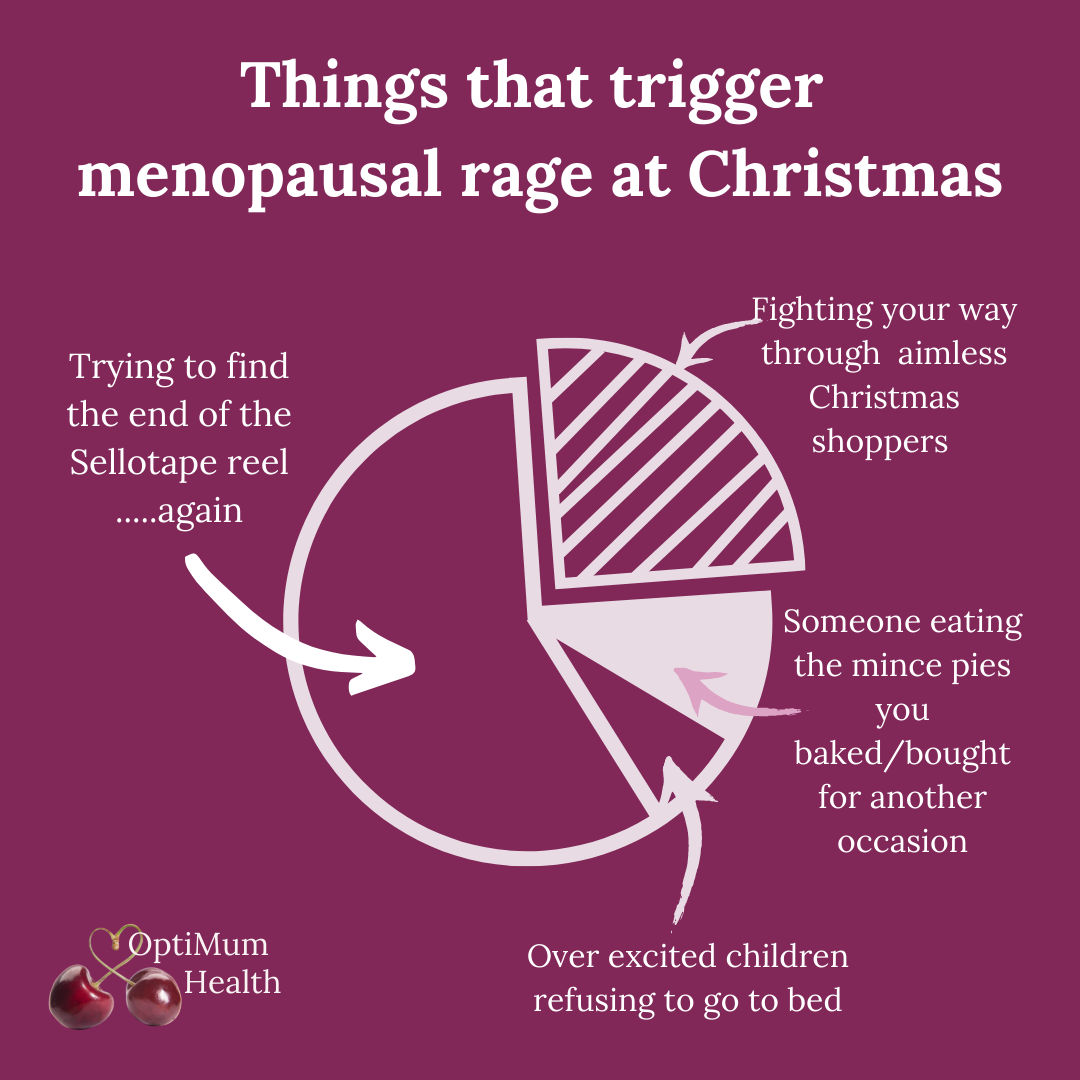
Things that you’d normally take easily in your stride could lead to a full on meltdown in the run up to Christmas – stealing your joy along with it.
I’ve got nothing new to say here that I haven’t already said in the points above – but those simple, obvious things work.
- Stay hydrated
- Make sure you’re eating enough and prioritising protein
- Get sufficient sleep
- Track what’s going on for you alongside your menstrual cycle so you can spot where your mood is likely to be more erratic (and take evasive action)
- Communicate! Tell those around you how you’re feeling and what you’d like them to do/say when you start flipping out
- Seek further help from your doctor and/or a counsellor to help identify tools that may help you harness your moods and manage your temper
Summing it all up
Christmas time and the run up to it can be a testing time, with many more demands than usual. It can produce a bit of a melting pot for those struggling through perimenopause…but it doesn’t have to.
- Look after yourself with hydration, good foods and sleep
- Plan in time for yourself throughout December
- Tell your loved ones how you’d like to experience Christmas this year and hear what they’d like – so you can all work on the same expectations
- Share what will help you with whatever you’re experiencing
- Treat yourself with kindness and understanding
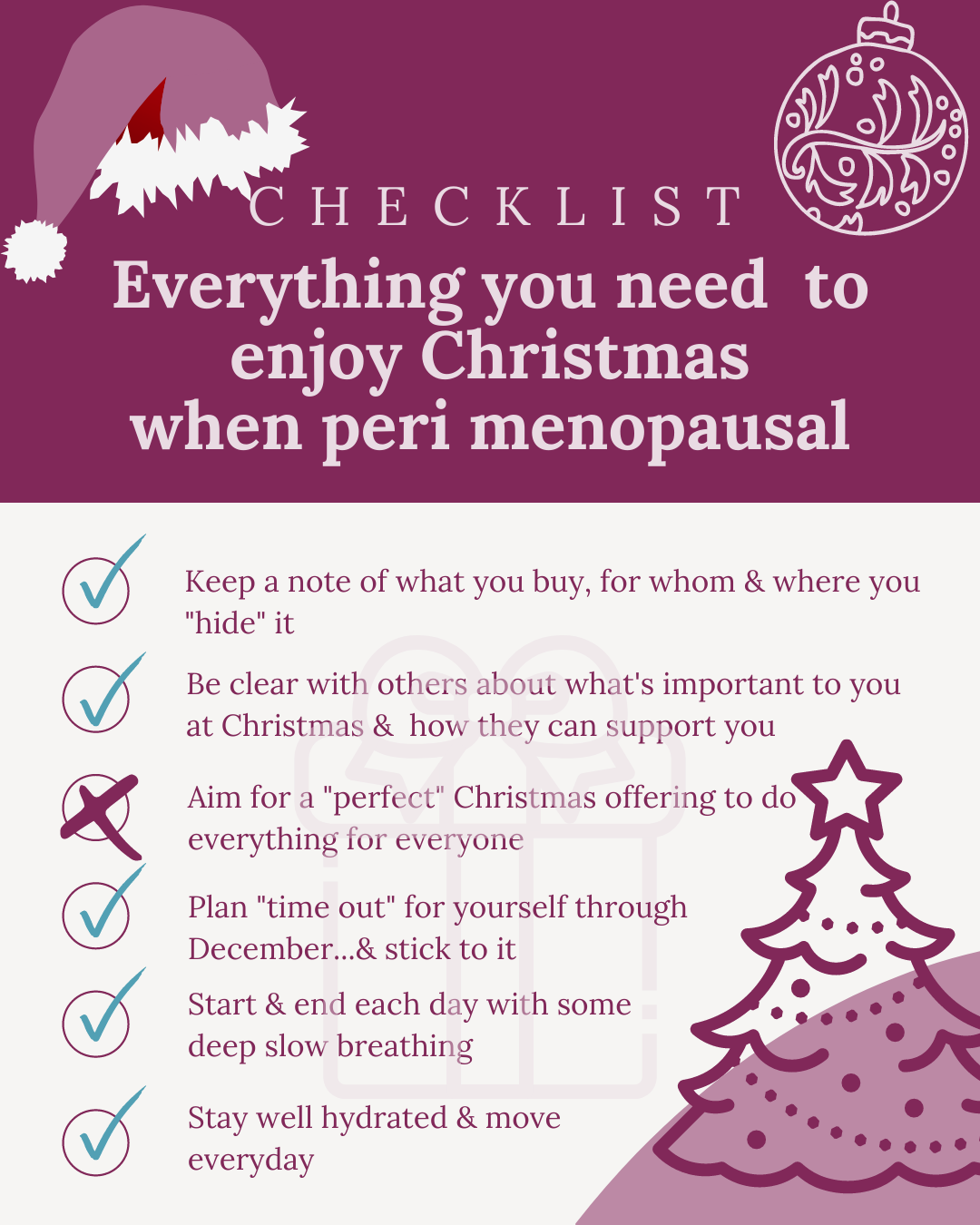
And my final tip, something I’ve done myself for a few years now. Take time to reflect on the past year and recognise what has brought you joy and what you’ve achieved.
Then buy yourself a gift. It doesn’t have to be anything extravagant – though of course it can be if that doesn’t add to your stress load. Wrap it and write a heartfelt gift tag to yourself from You, appreciating what you’ve done since last Christmas and pop it under your tree.
You deserve it.
Need more?
If you’ve got questions, would like to know how to apply any of this information specifically to you or want to know how I can help you further, please CLICK HERE and let me know.
There are no daft questions and, however peri-menopause (& Christmas) makes you feel, it’s important you know that you’re not alone.
The support options I’ve shared in this blog centre around
- mindset
- education and understanding
- nutrition
- exercise
and these are the foundations of my work with women experiencing peri-menopause that want to thrive and grow through this period of womanhood.
So get in touch if you’d like to know more.
Take care of You
* perimenopause is that period of years leading up to menopause when your hormones are fluctuating and your body is transitioning through “puberty in reverse”.
** NICE guidelines state that HRT and CBT should be considered for treatment of low mood in perimenopausal women and that evidence indicates that SSRI and SNRI (antidepressant medications) is not effective in treating low mood in menopausal women not diagnosed with depression
*** caffeine has a ‘half life’ of 4-6 hours, which means that 4-6 hours after drinking your tea, coffee, green tea or can of Monster at least half of the caffeine from that drink is still in your system.

